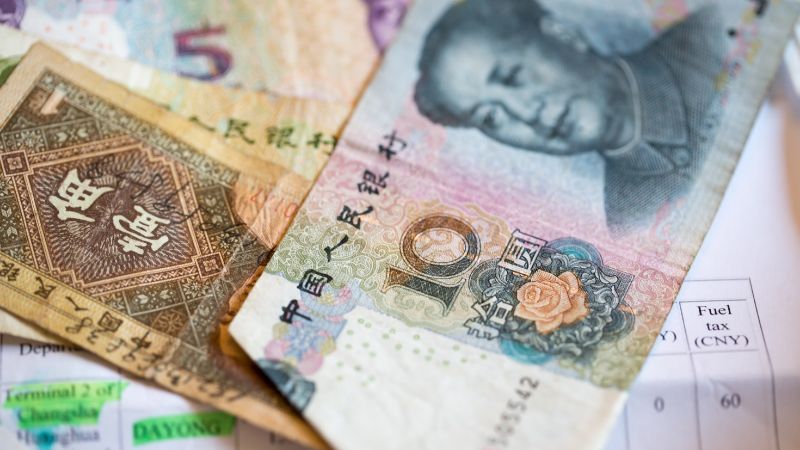According to Bloomberg, the recent shift away from relaxed monetary policies in Japan and an unexpected increase in interest rates in Taiwan have bolstered the attractiveness of the yuan as a source of funding for the carry trade in emerging markets worldwide.
After a recent lull in the successful trend of dollar-funded transactions and indications that the Federal Reserve may not be as lenient as expected, investors are reevaluating their approaches.
Carry traders typically take loans from low-yield nations and invest in more lucrative assets, often in developing economies. The most desirable currency for funding would exhibit minimal fluctuations and have limited potential for appreciation.
Despite the Bank of Japan no longer implementing negative rates, the yen continues to hold the title of the world's lowest-yielding currency. However, the anticipation of its increase in value and volatility could discourage potential borrowers.
In comparison, the yuan appears more favorable when considering the Taiwan dollar in terms of these metrics. Additionally, data from Bloomberg shows that the yuan is more appealing than the US dollar in both implied yield and volatility.



This year, the Chinese government has tightly controlled their currency, keeping it within a narrow range due to the slow economic state. However, on Friday, a drop below a significant support level indicates that officials are willing to allow the currency to decrease in value even more.
According to Brendan McKenna, a currency strategist at Wells Fargo Securities LLC, the Chinese yuan is now being considered more as a source of funding, as the People's Bank of China adopts a more relaxed stance in response to the country's struggling economy.
According to a note written by strategists from Goldman Sachs Group Inc., including Danny Suwanapruti, the stable trading range and low volatility of a particular asset make it a highly suitable option for carry trades. The note was dated March 11.
Moreover, as stated in Bloomberg's index, there has been a decrease of 0.6% in the performance of eight emerging market carry trades backed by the US dollar in the current quarter, after a notable increase of 4.5% in the last quarter of 2023.
The decrease in value could be attributed to investors exploring alternative avenues away from dollar-centric approaches. This shift arises amid signals suggesting the Federal Reserve might not pursue as forceful easing measures as initially expected.
According to Olga Yangol, the chief strategist for the Americas at Credit Agricole SA, there is no guarantee of a significant devaluation of the yuan. However, she believes that engaging in carry trades could be a beneficial decision. This statement was made before the recent central bank actions.
Yangol also mentioned her preference for the Turkish lira and some Asian currencies, while expressing her view that the Mexican peso is currently overpriced.
The one-month implied volatility of the yuan reached its lowest level since 2017 earlier this month, but then increased on Friday.
The interbank interest rates for the offshore yuan in Hong Kong, which serves as a benchmark for offshore borrowing costs, have dropped to approximately 3% from a high of almost 4.5% in September.
This week, Taiwan experienced an unanticipated rise in interest rates, causing the policy benchmark to reach its peak since 2008. This move could potentially decrease the attractiveness of the Taiwan dollar for carry purposes.
However, a few experts speculate that this increase, implemented to combat inflation, will mark the conclusion of the current cycle.
The attractiveness of the yen is still upheld by some due to Japan's persistently low interest rates. Despite the Bank of Japan (BOJ) increasing rates for the first time in 17 years, Governor Kazuo Ueda has affirmed that the policy will continue to be accommodating.
According to the yen overnight indexed swaps, there is an expectation that the BOJ's policy benchmark will increase to approximately 0.3% by December.
Furthermore, Nicholas Chia, a macro strategist at Standard Chartered Plc in Singapore, expressed that carry trades involving the yen as a funding currency will likely continue to be appealing.
Carry trades are probably going to remain attractive with the yen as a funder. This will be conditional on the BOJ keeping rates lower for longer, which I think will be the case.
Nicholas Chia
What to Keep an Eye On
On Tuesday, it is anticipated that the main interest rate of Hungary's central bank will be reduced, while South Africa's central bank will maintain its policy rate on Wednesday. Inflation data will be released by Brazil, Malaysia, and Poland, while unemployment figures for Mexico and Chile are also scheduled to be published.



